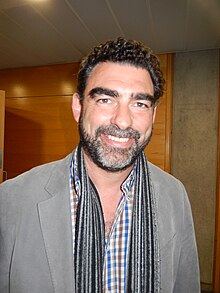Nick Lane
Nicholas James Lane | |
|---|---|
 In 2017 | |
| Born | 1967 |
| Nationality | British |
| Alma mater | Imperial College, Royal Free Hospital Medical School |
| Known for | Science writing |
| Spouse | Ana Hidalgo-Simon |
| Awards | |
| Scientific career | |
| Fields | Biochemistry, chemiosmosis |
| Institutions | University College London |
| Thesis | In vivo studies of ischaemia-reperfusion injury in hypothermically stored rabbit renal autograft (1995) |
| Website | www |
Nick Lane (born 1967) is a British biochemist and writer. He is a professor in evolutionary biochemistry at University College London. He has published five books to date which have won several awards.
Career
[edit]Educated at Imperial College, London, he earned his PhD at the Royal Free Hospital Medical School in 1995 with a thesis entitled In vivo studies of ischaemia-reperfusion injury in hypothermically stored rabbit renal autograft. He then worked as Medical Writer at Oxford Clinical Communications for a year before joining Medi Cine International a medical multimedia company, also as a writer. In 1999 he became strategic director at what was, by then, Adelphi Medi Cine, a post he held until 2002.[1]
He became an Honorary Researcher at University College London in 1997, has held the post of Honorary Reader since 2006 and was the first Provost's Venture Research Fellow there from 2009 to 2012. Since October 2013 he has been Reader in Evolutionary Biochemistry in the Department of Genetics, Evolution and Environment at UCL.[1][2] He is the author of popular science books and many articles on the origin of life, hydrothermal vents, evolution, and cellular biology, among topics. He is the winner of the 2015 Biochemical Society Award[3] and the 2016 Michael Faraday Prize.[4]
Publications
[edit]His book, Life Ascending: The Ten Great Inventions of Evolution, won the 2010 Royal Society Prize for Science Books.[5] He appeared on In Our Time on Radio Four on 13 September 2012, when the topic of discussion was the cell,[6] and again on 15 May 2014, when the topic was photosynthesis.[7]
Books
[edit]- Lane, Nick (2002). Oxygen: The molecule that made the world. Oxford University Press. ISBN 978-0198508038.
- ——— Fuller, Barry; Benson, Erica, eds. (2004). Life in the Frozen State. CRC Press. ISBN 978-0415247009.
- ——— (2005). Power, Sex, Suicide: Mitochondria and the Meaning of Life. Oxford University Press. ISBN 978-0192804815.
- ——— (2009). Life Ascending: The Ten Great Inventions of Evolution. Profile Books. ISBN 978-1861978486.
- ——— (2015). The Vital Question: Why Is Life The Way It Is?. Profile Books. ISBN 978-1781250365.
- ——— (2022). Transformer: The Deep Chemistry of Life and Death. W. W. Norton & Company. ISBN 978-0-393-65148-5.
Selected articles
[edit]- Lane, Nick (29 March 2006). "Mitochondrial disease: Powerhouse of disease". Nature. 440 (7084): 600–2. Bibcode:2006Natur.440..600L. doi:10.1038/440600a. PMID 16572142. S2CID 5084616.
- ——— (25 October 2006). "Cell biology: Power games". Nature. 443 (7114): 901–903. Bibcode:2006Natur.443..901L. doi:10.1038/443901a. PMID 17066004. S2CID 4430396.
- ——— (19 November 2009). "Biodiversity: On the origin of bar codes". Nature. 462 (7271): 272–274. doi:10.1038/462272a. PMID 19924185.
- ——— (7 August 2010). "Genesis Revisited'". New Scientist.
- ——— (25 June 2012). "Life: is it inevitable or just a fluke?". New Scientist. Retrieved 1 July 2012.
References
[edit]- ^ a b Lane, Nick. "Nick Lane CV". Retrieved 2 April 2015.
- ^ "UCL Provost's Venture Prize". University College London. Retrieved 2 April 2015.
- ^ "The Biochemical Society Award | Biochemistry Society". Biochemical Society. Archived from the original on 28 August 2010. Retrieved 2 April 2015.
- ^ "The Michael Faraday Prize". Royal Society. Retrieved 21 July 2016.
- ^ "Life Ascending rises to the top". Royal Society. Retrieved 25 July 2011.
- ^ "The Cell". BBC. Retrieved 8 July 2018.
- ^ "Photosynthesis". BBC. Retrieved 16 May 2014.

